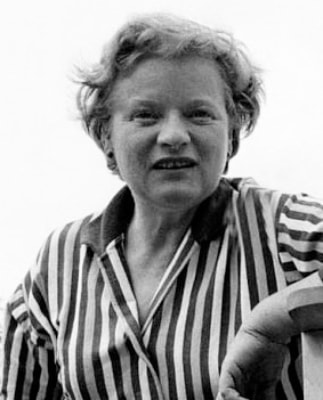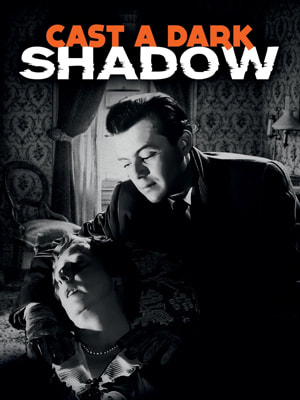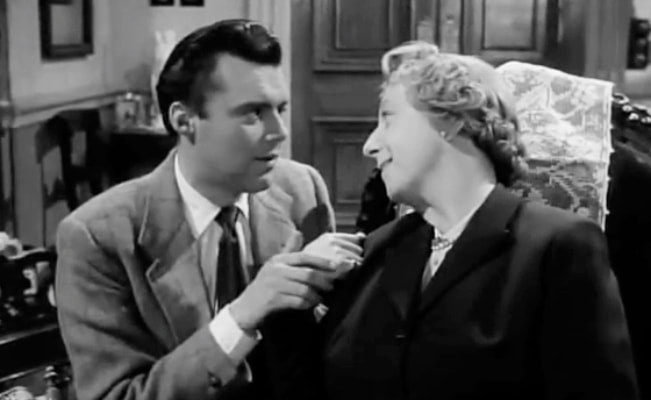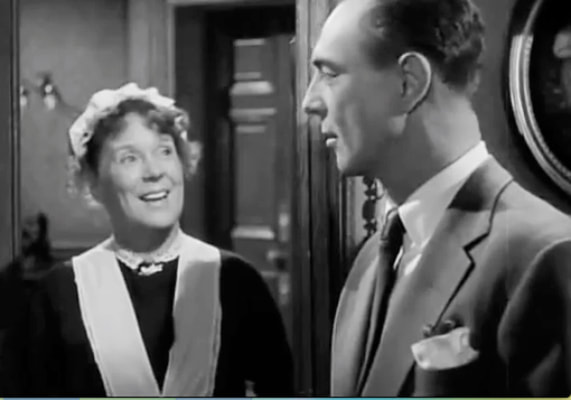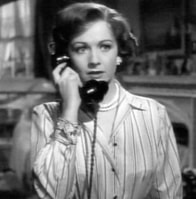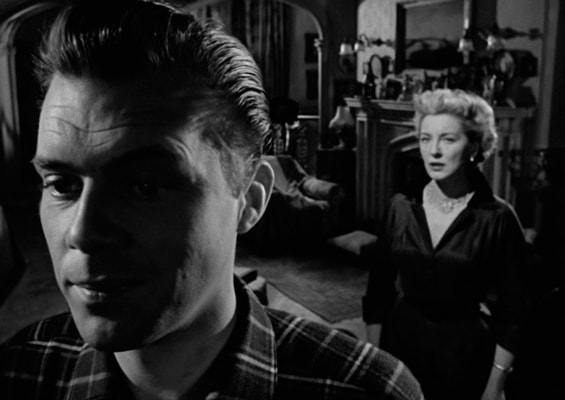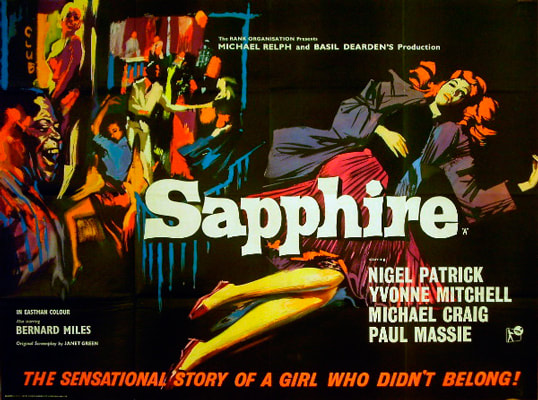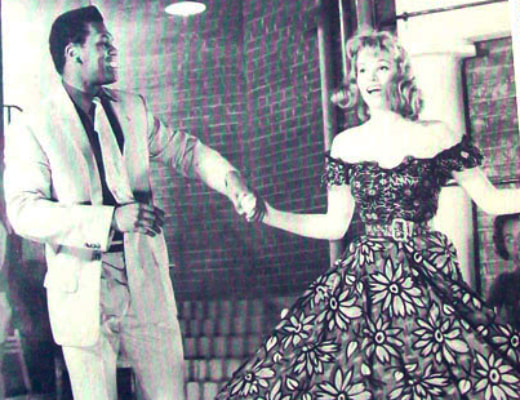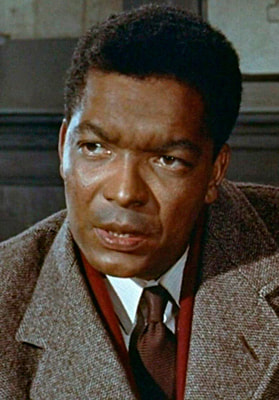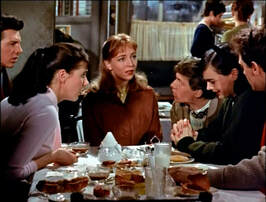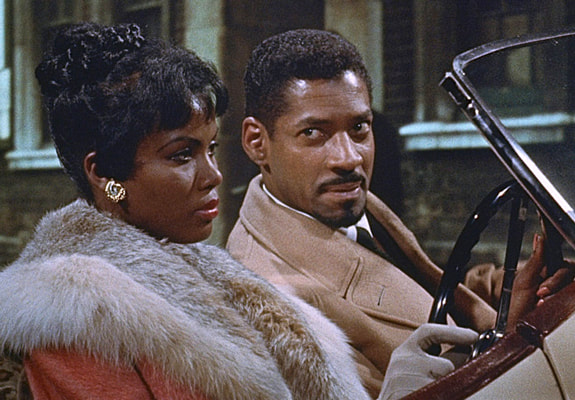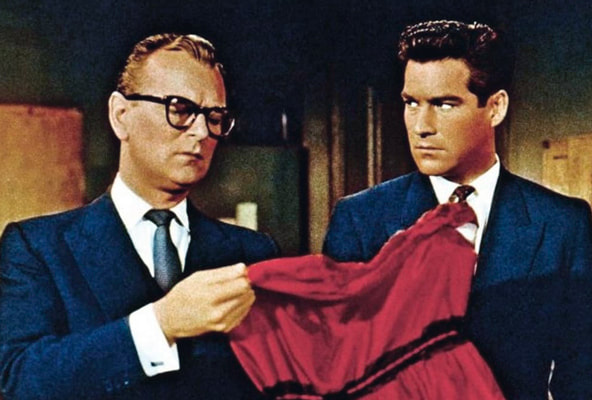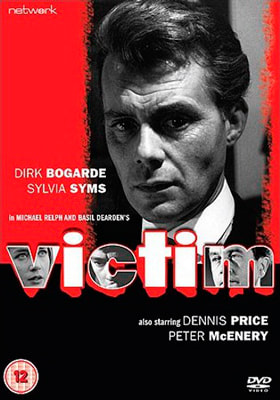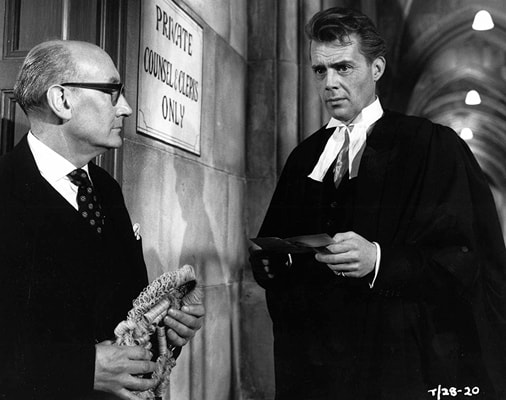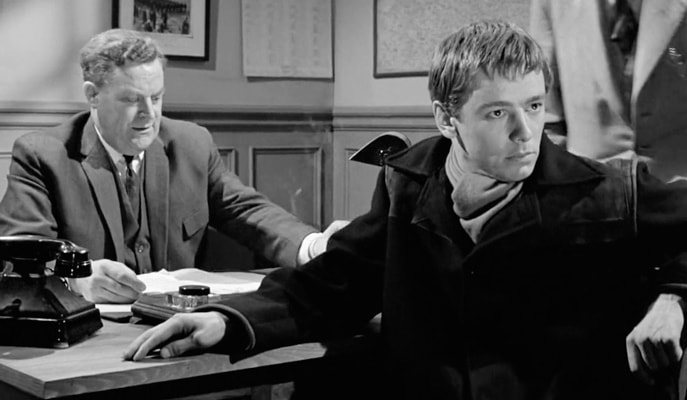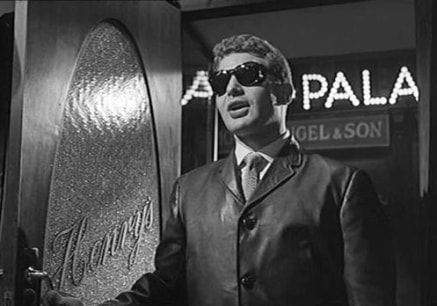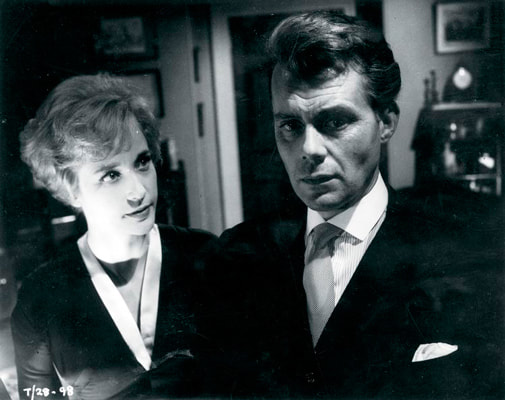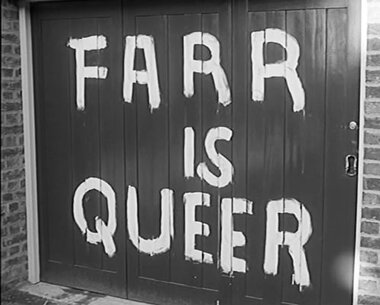Janet Green: Tapping into the Dark Side
A Retrospective
by Paulette Reynolds
May 5, 2021
by Paulette Reynolds
May 5, 2021
Cast a Dark Shadow * 1957 > A slick con man maneuvers his way through marriage and murder to reach the easy life.
Sapphire * 1959 > The murder of a biracial woman passing for white taps into racism and class bias.
Victim * 1961 > A London blackmailing ring targets homosexuals, threatening one barrister's marriage and rising career.
A loving Bluebeard. A racially motivated act of violence. A double life of secrets and shame. What do these three films have in common?
All three movies are the product of Janet Green, Britain's most celebrated "social issue" and film noir playwright and screenwriter during the late 1950s. Born in 1908, Green enjoyed a close collaboration with her second husband, screenwriter John McCormick, producing screenplays for my three favorite Janet Green films: Cast a Dark Shadow, Sapphire, and Victim. Both writers worked for the Rank Organisation from 1956–59, but she was often "overshadowed" by her spouse. *1
Cast a Dark Shadow:
Starring Dirk Bogarde/Edward "Teddy" Bare, Mona Washbourne/Monica Bare, Margaret Lockwood/Freda Jeffries, Kay Walsh/Charlotte Young, Kathleen Harrison/Emmie, Robert Flemyng/Phillip Mortimer
Starring Dirk Bogarde/Edward "Teddy" Bare, Mona Washbourne/Monica Bare, Margaret Lockwood/Freda Jeffries, Kay Walsh/Charlotte Young, Kathleen Harrison/Emmie, Robert Flemyng/Phillip Mortimer
Originally based on Green's play Murder Mistaken, Cast a Dark Shadow features Dirk Bogarde as the youthful husband (with dark intentions) of wealthy Monica, a sweet older woman. Edward "Teddy" Bare dotes on his trusting wife, much to the delight of housemaid Emmie and frustration of her lawyer, Phillip. They've enjoyed a contented marriage, with Monica spoiling Teddy while Phillip fumes. Certain that he's after her money, Monica couldn't care less, since her role as Sugar Mama suits both of them just fine.
But Monica's good intentions goes terribly wrong and Teddy is forced to look for another replacement wife. After a few afternoons at Brighton he meets, woos and quickly marries Freda. His latest choice is also his biggest conundrum, as Freda is a street-smart hustler who keeps Teddy on a short leash, with little money for sport. As Lady Luck would have it, another prospective bride literally knocks on his door, and then the plot gets thicker than pea soup in a London fog.
Cast a Dark Shadow highlights the talents of four women who come from different social strata: Monica and Charlotte are wealthy women, secure in the knowledge they know where their next shopping spree is coming from. Freda, the attractive doxie from the criminal class and Emmie, the loyal, befuddled working class maid are both quick to react to any economic threat to their security.
Hovering around this hive, is Dirk Bogarde's Teddy, masterfully playing them all for his own benefit; but what's fascinating here is his intense connection to Monica. It's not often we get to see the inner workings of a noir relationship that goes beyond the trope of betrayal. In Teddy, we are made to feel his loss at her sudden demise, that speaks to a deeper set of feelings as his lifelines disappear. We realize - together with our antagonist - that Monica meant more to him than a meal ticket, so that by the story's end, we actually mourn Teddy's loss of security and love.
Sapphire Cast:
Starring Nigel Patrick/Supt. Robert Hazard, Michael Craig/Inspector Phil Learoyd, Paul Massie/David Harris, Yvonne Mitchell/Mildred Farr, Harry Baird/Johnnie Fiddle, Bernard Miles/Ted Harris, Olga Lindo/Mrs. Harris, Earl Cameron/Dr. Robbins, Gordon Heath/Paul Slade
Starring Nigel Patrick/Supt. Robert Hazard, Michael Craig/Inspector Phil Learoyd, Paul Massie/David Harris, Yvonne Mitchell/Mildred Farr, Harry Baird/Johnnie Fiddle, Bernard Miles/Ted Harris, Olga Lindo/Mrs. Harris, Earl Cameron/Dr. Robbins, Gordon Heath/Paul Slade
Sapphire is a slick police procedural, a study in appearances, reminding us that nothing is as it seems in the land of film noir, especially when it comes to racism. The body of a young music student with red hair and pale skin, Sapphire Robbins, is discovered in Hampstead Heath, calling in London's finest Superintendent Robert Hazard and Inspector Phil Learoyd. "This girl was killed in hate," observes Superintendent Hazard.
It doesn't take long for the pair to identify her, calling into question the woman's fiancé, David Harris and his family. A look through Sapphire's belongings reveals a surprising collection of bright, colorful clothes, indicating the young woman wasn't just a quiet Royal Academy of Music student. But one look at Sapphire's brother - known only as Dr. Robbins - and we know just why she was murdered. "She died because she was colored," Superintendent Hazard firmly decides.
Suddenly, the film charts a dual course, traveling through Sapphire's twin worlds of white respectability and a love for jazz clubs on the wrong side of town. Hazard and Learoyd lead a large cast, serving as good cop/bad cop during their investigation, which reveals a range of British attitudes among 1950s Londoners. Sapphire's secret life produces a pregnancy, two lovers and a drive to disown her cultural identity. As suspects, students, and community residents are closely questioned, their answers reflect a diverse set of beliefs about color and acceptance that still feel uncomfortably familiar over seventy years later.
Janet Green's progressive screenplay is sometimes at odds with Basil Dearden's direction, most notably at Sapphire's favorite jazz club, the Tulip. The camera lingers too long over wild peek-a-boo shots, clashing with loud music and garish colors, in what seems like his commentary on a "primitive" connection between raucous music and people of color.
Green won the 1960 Edgar Award for Best Foreign Film Screenplay from the Mystery Writers of America; and the film would go on to win the BAFTA Award for Best Film. The twin themes of racial bias and murder are so masterfully intertwined, that's it's difficult to see where one ends and the other begins. Green leads us through a minefield of clues, McGuffins and suspects, until our final "ah ha!" moment arrives.
But the central character rests with Sapphire Robbins, who we see reflected in the diverse opinions of family, friends and associates that inhabit a world that's changing too slowly for some and too fast for others.
Victim Cast:
Dirk Bogarde/Melville Farr, Sylvia Syms/Laura Farr, Norman Bird/Harold Doe, Charles Lloyd-Pack/Henry, Peter McEnery/Boy Barrett, Donald Churchill/Eddy Stone, John Barrie/Detective Inspector Harris, Dennis Price/Calloway, Frank Pettitt/Barman, Mavis Villiers/Madge, Hilton Edwards/P.H., Nigel Stock/Phip, Derren Nesbitt/Sandy Youth, Alan MacNaughtan/Scott Hankin, John Cairney/Bridie, David Evans/Mickey, Margaret Diamond/Miss Benham
Dirk Bogarde/Melville Farr, Sylvia Syms/Laura Farr, Norman Bird/Harold Doe, Charles Lloyd-Pack/Henry, Peter McEnery/Boy Barrett, Donald Churchill/Eddy Stone, John Barrie/Detective Inspector Harris, Dennis Price/Calloway, Frank Pettitt/Barman, Mavis Villiers/Madge, Hilton Edwards/P.H., Nigel Stock/Phip, Derren Nesbitt/Sandy Youth, Alan MacNaughtan/Scott Hankin, John Cairney/Bridie, David Evans/Mickey, Margaret Diamond/Miss Benham
Of Victim, Janet Green wrote that it "was written with the shadow of the censor's axe". Homosexuality was illegal in England between two males, codified by the Buggery Act of 1533. As a consequence, persecution was rampant by both police and blackmailers, ending in humiliation, destroyed lives and imprisonment. Victim became the first British film to take on the subject of homosexuality and the unfair laws that existed against homosexuals. Dirk Bogarde, a closeted gay man himself, risked his career as the first major British star to play the lead, Barrister Melville Farr. *2
Bogarde remembers in his autobiography that he was "Playing the barrister with the loving wife, a loyal housekeeper, devoted secretary and the Secret Passion. It was the wisest decision I ever made in my cinematic life. It is extraordinary, in this over-permissive age [c. 1988], to believe that this modest film could ever have been considered courageous, daring or dangerous to make. It was, in its time, all three."*3
Green's screenplay, has long been considered ground-breaking for its unsentimental exploration of gay men living under the constant threat of blackmail, physical violence and jail time. Tension hits the ground running as Farr works to expose a blackmail ring, knowing that it will destroy his brilliant career and threaten his marriage. Along the way he goes where the police can't, trying to convince other victims to find the criminals and bring a measure of peace into their lives.
Favored by film critics as her best work, Victim suffers from an overuse of the Mea Culpa syndrome, as all but one gay character takes a bath in shame and regret about their sexual orientation. But today's celebratory approach among the LGBTQI community took centuries of struggle to reach that very core of pride that now exists within the movement.
In the anti-climatic speech (in fact written by Bogarde himself), Farr reveals *4
Laura Farr: You haven't changed. In spite of our marriage, in your inmost feelings, you're still the same. That's why you stopped seeing him. You felt for him what you felt for Stainer.
Melville Farr: That's not true.
Laura Farr: You were attracted to that boy as a man would be to a girl.
Melville Farr: Laura, Laura, don't go on, for God's sake, stop! Stop now!
Laura Farr: I can't stop. I love you too much to stop. I thought you loved me. If you do, what did you feel for him? I have a right to know.
Melville Farr: Alright, you want to know. I shall tell you. You won't be content until you know, will you? Till you ripped it out of me? I stopped seeing him because I wanted him. Do you understand? Because I wanted him!
Laura Farr: You haven't changed. In spite of our marriage, in your inmost feelings, you're still the same. That's why you stopped seeing him. You felt for him what you felt for Stainer.
Melville Farr: That's not true.
Laura Farr: You were attracted to that boy as a man would be to a girl.
Melville Farr: Laura, Laura, don't go on, for God's sake, stop! Stop now!
Laura Farr: I can't stop. I love you too much to stop. I thought you loved me. If you do, what did you feel for him? I have a right to know.
Melville Farr: Alright, you want to know. I shall tell you. You won't be content until you know, will you? Till you ripped it out of me? I stopped seeing him because I wanted him. Do you understand? Because I wanted him!
Such exchanges of self-loathing were standard in the early days of mainstream gay films (Boys in the Band comes to mind), and thankfully the post-Stonewall movement encouraged screenwriters to create characters that embraced their lives. The Sexual Offences Act of 1967 legalized homosexual acts between consenting men over the age of 21 and so continued the United Kingdom's fight for LGBTQI rights.
Janet Green was a talented writer, able to create multi-faceted characters who roamed through the shadows of both genteel country side and London's mean streets. During her lifetime she was acclaimed as an insightful writer of "social issues" cinema, bringing compassion and honesty to her screenplays - and by extension her characters - without any heavy-handed moralizing. While Cast a Dark Shadow doesn't fall into this category, it stands as one of my three favorite Green films. Her focus on the emotional range of the five characters, the depth of Teddy and Monica's relationship, and the clever film noir set-up simply can't be ignored here.
And finally, kudos to the Turner Classic Movies channel, for hosting a retrospective of Janet Green's work in 2020, and giving cinephiles the opportunity to discover such a memorable talent and three very unforgettable films.
REFERENCES
*1 McFarlane, Brian; Slide, Anthony (May 16, 2016). "The Encyclopedia of British Film: Fourth edition". Manchester University Press – via Google Books.
Paul Dehr's review (via the Daily Mail): "'It was Green who deserved the plaudits, for her human, observant and often very moving plea for tolerance towards the homosexual.'" Because she was often overshadowed by her husband, John MCCormick..."
*2 Collaboration and control in the development of Janet Green's screenplay Victim by Jill Nelmes May 2010Journal of Screenwriting 1(2):255-271 (JG 10/6: 25/10/60).
*3 Wikipedia Dirk Bogarde
*4 IMDb quote
*1 McFarlane, Brian; Slide, Anthony (May 16, 2016). "The Encyclopedia of British Film: Fourth edition". Manchester University Press – via Google Books.
Paul Dehr's review (via the Daily Mail): "'It was Green who deserved the plaudits, for her human, observant and often very moving plea for tolerance towards the homosexual.'" Because she was often overshadowed by her husband, John MCCormick..."
*2 Collaboration and control in the development of Janet Green's screenplay Victim by Jill Nelmes May 2010Journal of Screenwriting 1(2):255-271 (JG 10/6: 25/10/60).
*3 Wikipedia Dirk Bogarde
*4 IMDb quote
ADDITION REFERENCE:
Nelmes, Jill; Selbo, Jule (September 29, 2015). Women Screenwriters: An International Guide. Springer. ISBN 9781137312
This book features 300 women writers from 60 countries, through the cinema from 1896 to the present.
Nelmes, Jill; Selbo, Jule (September 29, 2015). Women Screenwriters: An International Guide. Springer. ISBN 9781137312
This book features 300 women writers from 60 countries, through the cinema from 1896 to the present.
COPYRIGHT 2012/2021. Paulette Reynolds. All CineMata Movie Madness blog articles, reviews, faux interviews, commentary, and the Cine Mata character are under the sole ownership of Paulette Reynolds. All intellectual and creative rights reserved.
